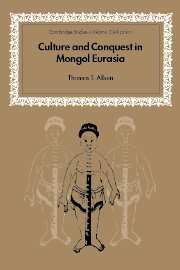Book contents
- Frontmatter
- Contents
- Preface
- Note on transliteration
- Abbreviations
- PART I BACKGROUND
- PART II POLITICAL–ECONOMIC RELATIONS
- PART III INTERMEDIARIES
- PART IV CULTURAL EXCHANGE
- 12 Historiography
- 13 Geography and cartography
- 14 Agriculture
- 15 Cuisine
- 16 Medicine
- 17 Astronomy
- 18 Printing
- PART V ANALYSIS AND CONCLUSIONS
- Bibliography
- Index
- Other titles in the series
15 - Cuisine
Published online by Cambridge University Press: 04 September 2009
- Frontmatter
- Contents
- Preface
- Note on transliteration
- Abbreviations
- PART I BACKGROUND
- PART II POLITICAL–ECONOMIC RELATIONS
- PART III INTERMEDIARIES
- PART IV CULTURAL EXCHANGE
- 12 Historiography
- 13 Geography and cartography
- 14 Agriculture
- 15 Cuisine
- 16 Medicine
- 17 Astronomy
- 18 Printing
- PART V ANALYSIS AND CONCLUSIONS
- Bibliography
- Index
- Other titles in the series
Summary
In the Mongolian Empire the office of ba'urchi, generally translated as “cook,” or sometimes as “steward” or “commissary,” had an unexpected importance. As noted earlier, in the Mongols' patrimonial conception of government, which was rooted structurally and ideologically in the qaghan's household establishment, the title of ba'urchi clearly advertised the holder's closeness to the ruler and his right to act on his behalf. Cooks were officers in the imperial guard (keshig), one formation of which, the night guard (kebte'ül), oversaw the provision and preparation of drink and food (undān ide'en) during the reigns of Chinggis Qan and Ögödei; in addition to their titular duties these officers often held active military commands. For example, Ked Buqa, who led the huge Mongolian field army against the Ismaʾīlīs and ʿAbbāsids in the 1250s, held the title of ba'urchi.
Indeed, the kitchen was the starting point of many an illustrious career in the empire. Bolad and his father were both ba'urchis and Bolad's friend and ally, Rashīd al-Dīn, also served in the same capacity; his “entry level” appointment is reported in Bar Hebraeus:
Now a certain Jew,whose name was Rashīd ad-Dāwlāh, had been appointed to prepare food which was suitable for Kaijātū [Gheikhatu], of every kind which might be demanded, and wheresoever it might be demanded.
- Type
- Chapter
- Information
- Culture and Conquest in Mongol Eurasia , pp. 127 - 140Publisher: Cambridge University PressPrint publication year: 2001



